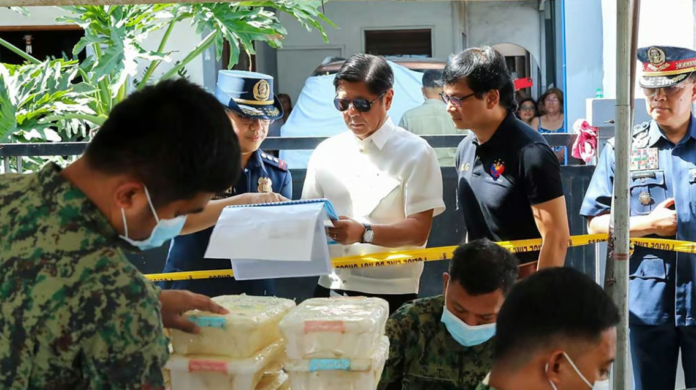President Marcos hailed the recent seizure of P13.3 billion worth of shabu in Batangas as a significant milestone in the country’s anti-drug efforts. The operation, which marked the largest drug haul in a single police action, showcased the effectiveness of the government’s “bloodless” campaign against illegal drugs.
The successful interception of two tons of shabu at a police checkpoint in Alitagtag town on Monday morning drew praise from Marcos, who joined officials from the Department of the Interior and Local Government in inspecting the seized drugs. Emphasizing the absence of casualties, Marcos lauded the arresting officers for apprehending a suspect without resorting to violence.
“This is the biggest shipment of shabu that we have seized. But not one person died. No one died, no one was shot, no one was hurt,” Marcos remarked, highlighting the non-lethal approach taken in combating the drug trade. He stressed the importance of halting drug shipments within the Philippines, signaling a relentless pursuit of illegal drug syndicates.
Authorities are actively pursuing leads to trace the source of the illegal drugs, which were discovered loaded in a passenger van during a routine checkpoint stop in Barangay Pinagkrusan. The van’s driver has been arrested and faces charges under the Comprehensive Dangerous Drugs Act of 2002.
A rigorous examination conducted by the Philippine National Police (PNP) confirmed the high quality and potency of the confiscated drugs. Marcos reassured the public of continued efforts to target drug syndicates, including those with government or political affiliations, through lawful means and judicial processes.
Under Marcos’s administration, there has been a notable shift in the anti-drug campaign strategy, moving away from previous approaches like “Oplan Tokhang.” The focus now includes prevention initiatives and rehabilitation efforts for drug users, with plans to collaborate internationally through organizations like Interpol and ASEAN.
The recent drug seizure surpassed previous records, underscoring the government’s commitment to curbing the illegal drug trade while upholding human rights and due process. Advocates like the Human Rights Watch have urged for a definitive end to violent drug war tactics, emphasizing harm reduction and policy reforms in dealing with drug-related challenges.
Statistics from the government’s anti-illegal drug campaign reflect substantial progress, with thousands of operations conducted, arrests made, and rehabilitation programs implemented. As the nation continues its fight against drugs, Marcos’s administration remains focused on achieving lasting solutions and ensuring a safer future for all Filipinos.




